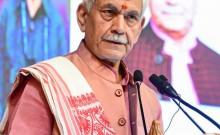
In a landmark judgment, a court in Jammu and Kashmir's Bandipora district has sentenced Abdul Wahid Mir, a Hizbul Mujahideen terrorist, to life imprisonment for the murder of Mohammad Shafi Hajam, a civilian, which occurred over three decades ago. This verdict comes 32 years after the tragic incident on December 7, 1993, in Onagam village, Bandipora district. The Additional District & Sessions Judge, Susheel Singh, delivered the sentence, marking a pivotal moment in the pursuit of justice for the victim's family.
Initially, the case was closed as "untraced" by the police in 1994, but it was reopened in 2004 following relentless efforts by Hajam's family. The court sentenced Mir to life imprisonment under Section 302 of the Ranbir Penal Code (RPC), along with three years of rigorous imprisonment under Section 201 RPC, and seven years under Section 7/27 of the Arms Act. All sentences are to run concurrently. Additionally, the Jammu and Kashmir Legal Services Authority has been directed to provide Rs one lakh compensation to Hajam's parents under the 2013 Victim Compensation scheme.
According to the prosecution, on the morning of the incident, Abdul Wahid Mir, accompanied by another Hizbul Mujahideen militant, Ali Mohammad Khawja alias Khan, entered Hajam's home. They demanded his scooter and coerced him into accompanying them. Eyewitnesses, including Hajam's brothers, testified that Mir led the victim to a nearby graveyard where he shot him point-blank in the forehead. The villagers intervened when Mir attempted to set the body on fire using kerosene.

Witnesses further stated that the militants terrorized the locality, issuing threats that anyone supporting Hajam's family would face the same fate. For weeks, the family lived in fear, unable to mourn openly as posters circulated branding Hajam an "informer." The crime was initially reported by a village chowkidar, but investigations failed to yield results, leading to the closure of the case in March 1994. A decade later, the victim's family gathered the courage to name the perpetrators, prompting police to reopen the case and record fresh statements.
Mir, who had admitted to his past involvement in militancy but claimed to have surrendered, faced trial for years. Multiple family members testified against him, providing harrowing details of the killing. In his order, Judge Singh described the crime as "heinous and shook the conscience of society." However, considering Mir's age—55 years—and prolonged incarceration, the court ruled out the death penalty. He is currently lodged in Central Jail Agra, where the court has directed his continued confinement, subject to confirmation of the sentence by the Jammu and Kashmir and Ladakh High Court.
Meanwhile, co-accused Ali Mohammad Khawja was acquitted of all charges. The court observed that the prosecution failed to prove his involvement beyond a reasonable doubt, with no substantive evidence establishing his participation in the murder. The court also acknowledged the role of the Additional Advocate General and the Legal Aid Defence Counsel in assisting proceedings, noting that their support was crucial in bringing the decades-old case to a conclusion.
Jammu and Kashmir Lieutenant Governor Manoj Sinha has ordered that family members of those killed by terrorists during the last 35 years, who are still waiting for justice, must come forward without any fear and lodge FIRs with the police to get justice. The L-G is also providing jobs to the next of kin of those killed by terrorists, but whose cases for compassionate appointments in government jobs were not followed and processed during the last 35 years. This case is a stark reminder of the long and arduous journey towards justice for victims of terrorism in the region.








